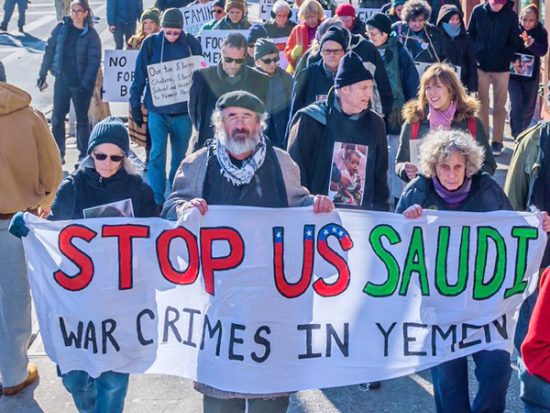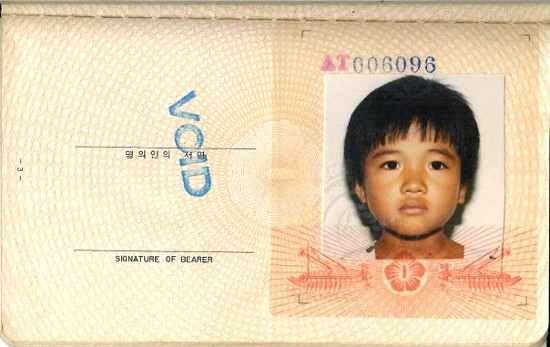How a young Chinese American followed in his
great-grandfather’s footsteps 112 years later
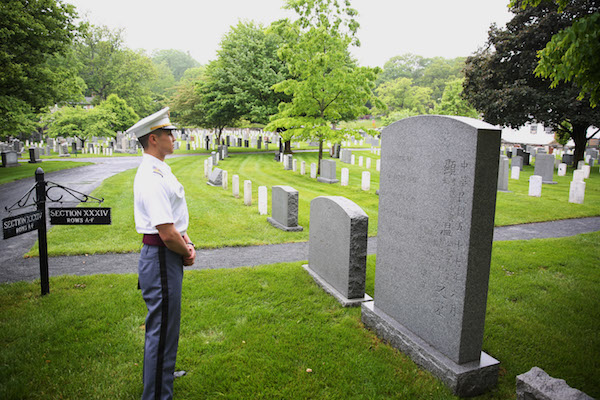
February 13, 2018
Alexander Kozlowski stood in front of a tomb inside the West Point Cemetery. The gravestone read: “Ying-Hsing Wen, Lt. Gen. Chinese Army, Class of 1909 USMA, First Asian Graduate.”
On May 27, 2017, at the 219th graduation ceremony at the United States Military Academy (USMA) in West Point, New York, 936 graduates of the Class of 2017 received their diplomas from U.S. Secretary of Defense James Mattis one by one. They were all in full-dress West Point uniform and wearing white gloves – the same look as what it was a century ago.
Their family members were in the audience at the academy’s Michie Stadium, proud and enthusiastically cheering for them.
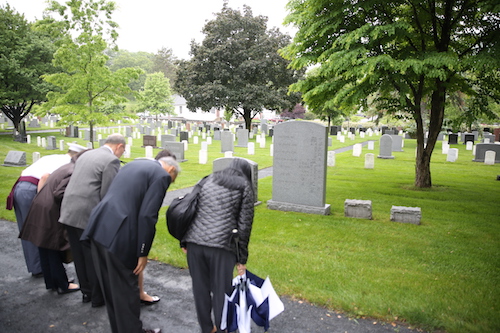
Kozlowski was one of the 936 graduates of the Class of 2017. His family members came from all over the world to witness his graduation.
More than a century ago, on June 11, 1909, his great-grandfather, Ying-Hsing Wen, received the same diploma from then Secretary of War, Jacob M. Dickinson, to become the first Asian graduate of the Academy.
Born in 1996, Alexander Kozlowski grew up in East Lansing, Michigan. His mother, Georgia Chao, is the granddaughter of Ying-Hsing Wen. His father, Steve Kozlowski, is Polish American.
“I have to encourage myself by looking at his photo everyday.”
Kozlowski didn’t know much about his Chinese great-grandfather, who passed away in 1968 in Washington D.C. As a child, he only knew Wen by the old pictures hanging on the wall of his family home and through family members’ random chats. “When I was a kid, the only things I knew about great-grandpa was that he graduated from West Point, and used to be a general in China,” Kozlowski said.
When he was in high school, Kozlowski started to search for more information about his great-grandfather. He learned that after graduating from West Point, Wen went back to China and had a legendary military career. He was a general in the Chinese Army. Encouraged by this, Kozlowski made the decision to follow in his great-grandfather’s footsteps an enrolled at West Point and pursued a career in the military.
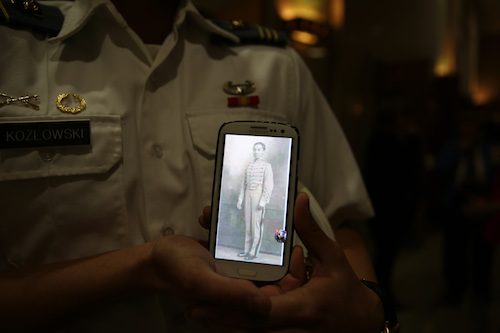
After he was admitted as a cadet at West Point, Kozlowski made the photo of his great-grandfather in a West Point uniform as his cellphone wallpaper. “I have to encourage myself by looking at his photo everyday,” Kozlowski said. Thinking about his great-grandfather’s legacy definitely encouraged him to get through the extremely rigid academic and military training at West Point.
Like Kozlowski, Ying-Hsing Wen’s pursuit of military service was also inspired by family tradition.
George Washington Sing Sing
Born in 1887 in Canton, China, Ying-Hsing Wen developed an interest in the military, stemming from his uncle, Tsung-Yao Wen, who was serving as the Viceroy of Tibet. He sought every opportunity to study abroad in the hope that he could return to modernize the Chinese military one day.
However, in 1882, U.S. President Chester Arthur signed The Chinese Exclusion Act, which bans the entry of Chinese laborers into the United States for 10 years. It was made permanent in 1902 by Congress. China retaliated by boycotting American goods.
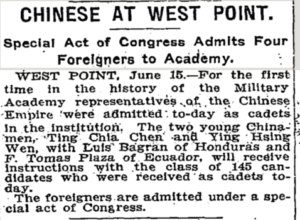
Worried by the Chinese retaliation, President Theodore Roosevelt recognized that “the chief cause in bringing about the boycott of our goods in China was undoubtedly our attitude towards the Chinese who come to this country.”
He pointed out that a good relationship between the U.S and China is “needed in our own interest.”
It was during the Roosevelt administration that Wen, at the age of 17, was granted a fellowship by the imperial government of the Qing Dynasty. He would soon depart for the U.S., to attend the Virginia Military Institute.
After one semester at VMI, Wen and another Chinese student, Ting-Chia Chen, transferred to West Point, under a special act passed by U.S. Congress, in the summer of 1905, and joined the Class of 1909. Wen and Chen’s enrollment at West Point was mentioned in The New York Times. “CHINESE AT WEST POINT, ” said the article in the June 1, 1905 issue of The Times.
Four years later, another New York Times article told the story of Wen’s graduation. According to the article, published on June 21, 1909, when Wen went on stage during the commencement ceremony to get the diploma from U.S Secretary of War Jacob M. Dickinson, “the cheers of the cadet corps shook the building, and Wen was so pleased that he winked at his classmates and left the rostrum all smiles.”
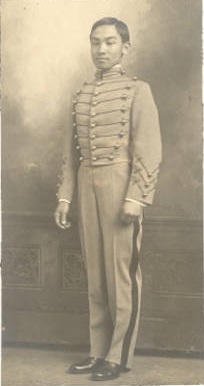
article describes Wen as “one of the most popular students in the Military Academy,” and also “one of the brightest,” noting that “despite the handicap of his language, he managed to graduate 84th out of a class of 104 members.”
That West Point Class of 1909 also produced 28 generals, including General George S. Patton Jr.
Wen’s cameraderie with his classmates and cultural exchange was evident. West Point’s yearbook, The Howitzer, said: “Wen has assumed a great many American characteristics, and is even getting proficient in American profanity. We expect great things of him when he returns to his native land to apply the tactics of Willie Pickle to the conquest of Asia.”
At West Point, Wen’s American classmates’ nickname for him was ‘George Washington Sing Sing.’
From Lieutenant General to Laundromat Owner
Ying-Hsing Wen returned to China upon graduation, hoping to modernize the Chinese military. At first, he served as a math teacher at the Cantonese Military Academy. But when the Xinhai Revolution broke out in 1911, he joined the revolution to depose the Qing Dynasty and establish the Republic of China. Wen then served as Secretary to Dr. Sun Yat-Sen, the founding father of the Republic of China.
Rising quickly through the ranks, Wen made it all the way to lieutenant general of the Chinese Army, leading the fight against the Communists and Japanese invaders during World War II.
Wen also served as an advisor to the Chinese government on U.S.-China relations.
After the communist revolution in China won, Wen was forced to leave the country. Due to his strained relationship with Chiang Kai-Shek, the then leader of the Republic of China, Wen did not join him as the latter fled to Taiwan. Instead, Wen decided to retire from the Army and moved to the U.S. via Hong Kong. With the help of friends he met at West Point, Wen settled down in Washington, D.C. and opened a laundromat. After more than 40 years in the military, Wen ended up as a small-business owner.
“Yeh Yeh’s so dressed up, he must have a West Point function”
Now in her 60s, Harriet Wen Tung still remembers the years during her childhood when she and her brother lived with their grandfather, Ying-Hsing Wen, in Georgetown, D.C. Tung now resides in Hong Kong, and is married to Chee-Chen Tung, the brother of Hong Kong’s first Chief Executive, Chee-Hwa Tung.
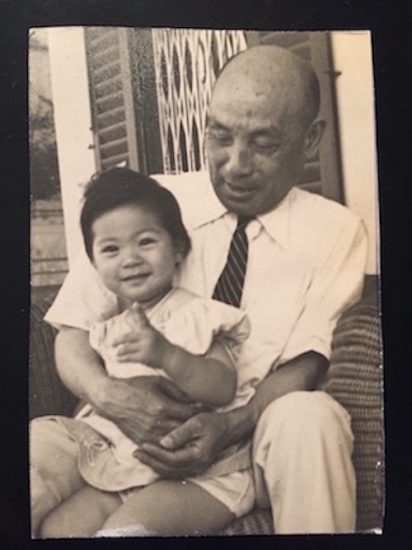
“Yeh Yeh (grandpa in Chinese) was a strict man of few words, but he led by example,” Tung recalled. “He was very generous. Every relative who immigrated to U.S. could always get help from him. He had so many family members who just came to the U.S. to stay with him and work at his business. Everyone worked hard, but no one worked harder than Yeh Yeh,” she said.
But in Tung’s memory, “Yeh Yeh never mentioned his military career to us.”
Her cousin, Alfred Wen, whose father was Ying-Hsing Wen’s third son, Yue-Hsing Wen, also recalled that their grandpa never talked about his achievements during his military career when they were living with him during their childhood.
Although he kept silent about his military career in China, Wen was happy and excited to share with his grandchildren and family members his experience from his time at West Point. “I can still remember his slim physique and erect West Point posture,” Tung said.
“Sometimes he would put on a hat and suit, and get very excited. We would say ‘Yeh Yeh must have a West Point function because he’s all dressed up.’”
On May 28, 1968, Ying-Hsing Wen passed away in D.C. at the age of 81. He was then laid to rest at West Point Cemetery. The gravestone on his tomb is the only one in the cemetery which is written in both Chinese and English.
“I fulfilled my dream of joining the military,” Kozlowski said. “I hope I can make my great-grandpa proud.”
Kozlowski is now the second West Pointer in Wen’s family. And it took a century. During his four-year stay at West Point, he made it a point to always visit his great-grandfather’s tomb at the cemetery “I really wish I could have met him,” Kozlowski said. “I always thought about great-grandpa’s accomplished life, from being a cadet like me to being a general. I compare myself to him and set higher standards for myself.”
108 Years; Duty, Honor and Country
More than 100 years after Wen’s graduation, 60 Asians are among the graduates of last year’s batch. Cadets with Chinese heritage are no longer rare in West Point nowadays. Moreover, Chinese has become the most popular subject in the Department of Foreign Languages at West Point.
Each year, more than 150 students who graduate from West Point take the Chinese class, according to Frank Kessler, deputy director of the Center of Language, Culture and Regional Studies at West Point. Moreover, there are 50 graduates of the Department of Foreign Languages who majored in Chinese.
Kozlowski was one of 50 graduates from the Class of 2017 who majored in Chinese. He pointed out one key factor in choosing Chinese as his major – his pride in his Chinese heritage. Kozlowski, whose Chinese name is Li-Ren Ke, spent a semester in Fu Jen University in Taiwan as an exchange student, and studied Chinese in Beijing and Shanghai as well. “I hope some day I would be able to visit my great-grandpa’s hometown, Toyshan,” Kozlowski said.
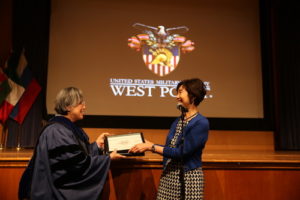
In 2009, during the 100th anniversary of Ying-Hsing Wen’s graduation, his family members gathered at West Point. At the reunion, the Wen family decided to establish a fellowship in the name of Ying-Hsing Wen to inspire young West Point cadets to learn Chinese and understand Asian culture and history. Since 2010, West Point’s Department of Foreign Languages, with support from the Wen family, has been giving out the Lt. Gen. Ying-Hsing Wen Memorial Award.
Each year, a graduating cadet is awarded for his or her outstanding achievements in Chinese language study as well as Asia study. Additionally, every two years, two cadets are selected for the Lt. Gen. Ying-Hsing Wen Travel Award, that comes with a stipend to be used for traveling to mainland China or Taiwan.
“It is very gratifying to see this journey come full circle,” Harret Wen Tung said in her speech for West Point’s Department of Foreign Languages Award Ceremony in May, two days before the commencement ceremony for the Class of 2017. “The destinies of these two great nations are intertwined, so it benefits the relationship to understand each other,” she said.
“Yeh Yeh followed the motto of Duty, Honor and Country,” added Tung. “I’m sure if Yeh Yeh was alive today, he would be delighted to see a strong and modern China as a driving force of today’s global economy. He would be surprised that Chinese is the most popular foreign language at the Academy and amused by the cadets’ efforts to speak and understand it.”
On May 27, 2017, 95-year-old Anna Wen, the only daughter of Ying-Hsing Wen, travelled from D.C. for her grandson’s graduation. Sitting in her wheelchair, surrounded by family members in the VIP Lounge of the Michie Stadium at West Point, she witnessed history coming full circle. After 108 years, Wen’s family welcomed another West Point graduate in the family again.
In August, Second Lieutenant Alexander Kozlowski departed for deployment to the United States Army installation in Fort Bragg, North Carolina. “I fulfilled my dream of joining the military,” Kozlowski said. “I hope I can make my great grandpa proud.”

